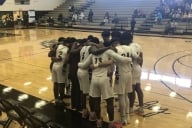You have /5 articles left.
Sign up for a free account or log in.
You can’t plan for everything, and increasingly it seems like the one thing you don’t plan for will undermine your public university presidency.
Holden Thorp, chancellor at the University of North Carolina at Chapel Hill, announced Monday that he would step down as chancellor at the end of the school year, only his fifth on the job, a premature exit for a chancellor whom many expected to serve at least 10 years.
Prior to being named chancellor in May 2008 at just 43 years old, Thorp had risen meteorically through the ranks of UNC’s administration, from professor to dean of the university’s College of Arts and Sciences in five years, and was seen as something of a wunderkind. A UNC graduate with deep ties to the state, a noted chemist who spent his career at the university, and a successful entrepreneur, Thorp was viewed by many as a perfect fit for helping move the university into the 21st century, bring entrepreneurship and innovation to the forefront of campus activity, and confront a litany of challenges related to funding, direction and academics.
But less than six months into his tenure, the country and state’s economies collapsed, forcing Thorp to confront budget cuts, salary freezes and protracted revenue constraints. The state’s political leadership, once immensely supportive of UNC-Chapel Hill and the rest of the university system, saw significant turnover in 2010. And since 2010, the university has been plagued by a series of scandals -- many originating in the university’s athletics program – that have dominated local media headlines.
Many at UNC say Thorp's seemingly perfect pedigree for the job was undermined by what he inherited: a series of headline-grabbing and time-consuming problems that they say would doom any president. “Holden Thorp was largely the victim of circumstance,” said Jay Smith, a history professor at the university who worked on a faculty investigation of the university’s athletics problems. “His experience shows just how treacherous the waters of higher education are right now. If someone of his talents and energy and commitment can’t succeed in this position, it makes you wonder who can.”
But others say that Thorp’s background in academics and quick rise through the ranks left him unprepared to tackle the types of Gordian knots that modern university presidents face, particularly the athletics scandals. “The drip-drip-drip of scandals suggest that Thorp has a poor understanding of shortcomings on his campus and insufficient appreciation of their import once they come to his attention,” wrote The Charlotte Observer’s editorial board on Sunday.
A spokesman for UNC-Chapel Hill said Thorp did not have time Monday to respond to a request for comment.
Regardless of the exact reason for Thorp’s departure, he is the latest in a long list of prominent public university presidents who were either forced out of their positions or chose to step down in the past two years. That list includes the presidents of the University of Arizona, the University of Wisconsin at Madison, the University of Oregon, Pennsylvania State University, and, depending on the criteria, the University of Virginia, whose president was reinstated shortly after she was forced out.
In many cases, these presidents said they were either driven out by scandals that happened on their watch but that they were unaware of, or that political forces conspired to drive them out. You can do everything right, they say, and the job will still find a way to bring you down.
Higher education observers say the widespread turnover – and occasional panic by boards – is indicative of broader shifts in the higher education landscape that are making the role of public university president increasingly difficult and different from any other job.
“These universities are going through historic, unprecedented change that no one is prepared for. Truly, it’s an environment where, particularly at large universities, you’re responsible for bringing in hundreds of millions of dollars in research funding, hundreds of millions in endowments, engaging in economic development and entrepreneurial activity,” said Lucy Leske, vice president, partner, and co-director of the education and not-for-profit practice at Witt/Kieffer, an executive search firm. “How can you be trained for this?”
Those shifts are forcing people like Leske to reconsider how colleges and universities choose new leaders.
A Difficult Job
Flagship Public University President Departures since 2010
Resignations:
- Carolyn A. (Biddy) Martin – University of Wisconsin at Madison
- Michael Hogan – University of Illinois System
- Robert Shelton – University of Arizona
- Robert J. Birgeneau – University of California-Berkeley
- Holden Thorp – University of North Carolina-Chapel Hill
Firings:
- Graham Spanier – Pennsylvania State University
- Richard Lariviere – University of Oregon
- John Lombardi – Louisiana State University System
“Near Misses”:
- Teresa Sullivan – University of Virginia
- William Powers – University of Texas
By many measures of university success, UNC-Chapel Hill thrived under Thorp’s leadership. The institution has been steadily climbing the ranks in terms of research expenditures, cracking the top 10 this year. Student applications increased, and the academic profile of the incoming class was at its highest levels. Fund-raising increased despite the recession.
Immediately prior to the recession the university brought in management consultants Bain & Company to review the institution’s administrative structure and find ways to reduce costs. The university made national headlines for that review, the recommendations from which are estimated to save $50 million a year. Other notable universities, including the University of California at Berkeley, Cornell University and the University of Connecticut, have since hired consultants to perform similar work.
Joe Templeton, a long-serving chemistry professor at UNC who once chaired the university’s faculty and has led the implementation of the Bain report as special assistant to the chancellor, said that in terms of faculty and student success, the university is right where it should be. “As far as the things that as faculty we care about and pay attention to, the structure is in good shape and the future is bright,” he said.
But Templeton and others note that those victories have been overshadowed by the myriad scandals Thorp has faced, particularly in the state and in the local media.
First there was the NCAA investigation into the university’s football program that found that players received impermissible benefits from agents. The football program received sanctions from the NCAA that included a one-year ban in post-season play and scholarship reductions. That scandal led to the firing of head football coach Butch Davis -- a story that caught national attention and generated significant controversy among fans and alumni -- and the resignation of longtime athletic director Dick Baddour.
The football scandal also uncovered academic fraud by some members of the football team, including evidence that a tutor altered players’ papers.
Further investigation by local media ultimately found that more than 50 courses offered between 2007 and 2011 in the university’s department of African and Afro-American Studies included some type of questionable academic activity, including professors who did not actually teach, who changed grades, and who faked faculty signatures on grade rolls. That controversy led to the resignation of the department's chair. The finding by the NCAA that these problems did not violate association rules generated dismay among sports columnists.
Finally, there was the revelation last week that the university’s chief fund raiser, Matt Kupec, had worked to set up a university position for his girlfriend, Tami Hansbrough, the mother of a former basketball star at the university. That news was compounded by the fact that Kupec and Hansbrough took private trips at the university’s expense. Both have since resigned.
"I've had a lot of things that have happened over the past two years that have been difficult, things that Carolina's never really faced before," Thorp told the Associated Press after his resignation. "A lot of them came from policies that we've had in place for a long time that weren't really adequate to catch things that needed to be caught. I also trusted some people who didn't do things the right way. And I think that whenever I found out about these things I took action, put reforms in place and made sure that the things that happened make this a better university."
UNC faculty and others say that none of these scandals on its own would likely be enough to end a chancellorship. “If he had not had to withstand two years of withering critique, he might have been able to get through this latest one,” Smith said.
Several faculty members said Thorp likely could have done a better job “getting out in front” of some of the issues and communicating the university’s problems with the public.
John Lombardi, former president of the University of Florida, the University of Massachusetts at Amherst, and the Louisiana State University system, said presidents who come from the academic side of the university often don't recognize just how difficult a challenge athletics presents. It's watched by more eyes than the rest of the university and involves a significant amount of money. It also has a different attitude and timeline than the rest of the institution. “The intensity of sports is underestimated,” he said. “Winning is an unambiguous, clock-driven behavior.”
Lombardi, who has himself experienced departures from roles sooner than he would have preferred, noted that it is not just athletics that can do a president in. Universities are so complex and vast that there's always going to be something that the president doesn't understand before stepping into the role. Administrators sometimes have little experience with politics or health care systems, both of which present a myriad of potential problems. Leske noted that simply working with a board is a challenge to some who step into the role that could quickly undermine their potential.
Lombardi said that developing a strong team is key to leadership.
Resignation
According to local media reports, Thorp tendered his resignation to UNC system President Tom Ross on Sunday. He said members of the system’s Board of Governors and university’s Board of Trustees tried to convince him to stay on, but that his decision was final.
“I will always do what is best for this university. And what is best right now is for me to make plans to step aside,” he said in an e-mail to the campus community. “This wasn’t an easy decision personally. But when I thought about the university and how important it’s been to me, to North Carolinians and to hundreds of thousands of alumni, my answer became clear.”
Just weeks earlier, the university’s provost announced that he would be stepping down and that a search would attempt to have someone in the job by the end of June, when Thorp will formally step down. Since the provost search has since been put on hold, it’s clear that Thorp’s decision to resign caught many by surprise.
Thorp’s departure opens up one more high-profile flagship public leadership position. In addition to UNC, the University of California at Berkeley, the University of Wisconsin at Madison, and Pennsylvania State University will all be searching for new presidents this year.








